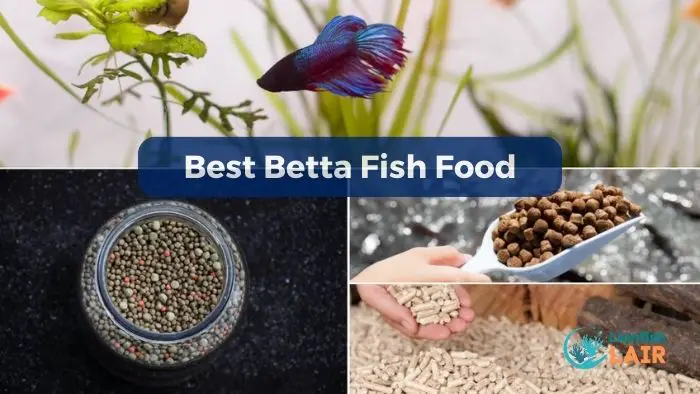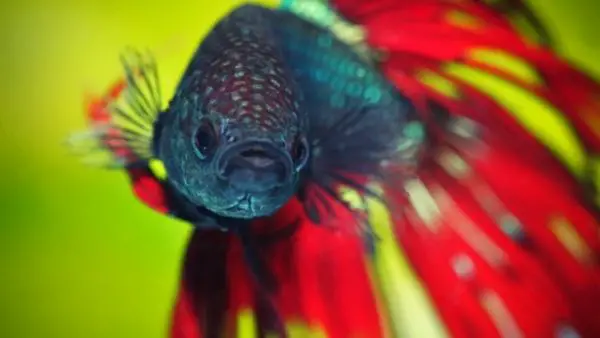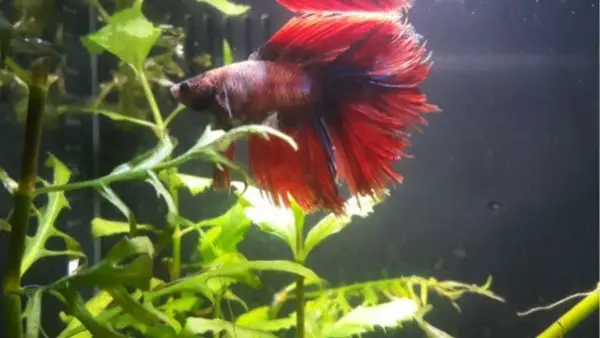Betta fish are undoubtedly one of the most popular tropical fish within our hobby, boasting incredible coloration and stunning patterns displayed on the many different types of Bettas. Something that is sometimes overlooked is that they are naturally aggressive and territorial siamese fighting fish, and their feeding habits and Betta food requirements can often lead to confusion.

For hobbyists, it can be a real struggle to correctly feed Betta fish, they can be greedy and aggressive during aquarium feeding times. They might seem like they will literally eat anything as they will occasionally try to steal food from their Betta tank mates, however, this is far from the truth.
Knowing which foods are best for Bettas, how often they should be fed and other feeding guidelines will all be covered in this Betta fish food guide.
What Is The Best Betta Fish Food?
There are many different types of Betta fish food that are available today, with the most common being flaked food, however, pellets and live foods are brilliant options too, especially for maintaining a balanced diet.
Flaked Food
If you speak to any Betta fish expert they will tell you that flaked food is a fantastic choice for them. Fish flakes will provide enough nutrients for your Betta fish and can be found in any fishkeeping store, the majority of pet stores, and online.
Tropical fish flakes are popular because of their nutritional content and affordability. They contain the nutrition that your fish requires, but are certainly less nutritious than freshly prepared foods and live food. Your Betta will certainly enjoy flaked food, but Bettas, in general, should be fed flakes less often than most other fish. Additionally, swapping flakes in and out of their diets is also a good idea.
Pellet Food
Pellets are perhaps the most effective source of food for your Bettas and they can also be used on a daily basis. They are higher in quality than flakes and can be easily located in almost all fishkeeping and pet stores and online.
The majority of pellets come in small cans that include feeding instructions. They include more nutrients than flakes but are slightly more expensive. Additionally, pellets are a common source of food for other fish that Bettas can live with, like the Neon Tetra.
Freeze Dried Food
Freeze-dried food is another brilliant option, it is the same food that you will get with live food, the only difference is that all the moisture has been removed from freeze-dried foods.
They do not contain the same nutrients as live or frozen food, however, they do have more nutritional value than both flakes and pellets. They can be used on a daily basis, which is great, but they are more expensive than both flaked and pellet foods, but for good reason.
Live Food
Live food is certainly the best type of food to feed your Betta fish and most other fish for that matter! Not only does live food mimic what your fish would be eating in the wild, but it fulfills all the dietary requirements and nutritional values that Bettas require.

Price, availability, and consistency are the biggest drawbacks with live food, unfortunately. Live foods are almost always more expensive than any other fish food and are much harder to locate too! Not to mention, they require very specific storage conditions.
Live foods typically include invertebrates such as brine shrimp and worms. They come in many different varieties, but this means that the prices vary too. Worms are usually the most affordable option. Bettas love eating live food as it best resembles their diet in the wild, their sharp teeth make it easy to feed on blood worms and shrimp too.
Frozen Food
Frozen foods are typically the same as live food, the only difference is frozen foods are, you guessed it, frozen. Many people choose frozen foods because they are convenient to store and still hold a similar nutritional value as live food.
By keeping food frozen you are increasing their lifespan and "shelf life", and also reducing the possibility of contamination from occurring in your tank. Frozen food is certainly less expensive than live food, however, you will lose a bit of the nutrition with frozen foods, but not enough for it to be an issue.
Feeding Your Betta Fish (How To)
Feeding your fish tank is such an important operation, regardless of the fish residing in it. Not getting this process right will likely result in overfeeding your fish, and that is not good at all for your fish or tank.
In order to keep your Betta fish as healthy as possible, you need to figure out how regularly you should be feeding Betta fish and how much you should be feeding them.
How Much Food Should You Feed Your Betta Fish?
Like most other fish, Bettas cannot control their own appetite or feeding times. Typically, when in the wild Bettas will be constantly looking for prey as food isn't as accessible as it is when in captivity. Fish in general will not know when they are full up either, which can be dangerous.
There is, however, a trick to telling how much food you should feed your Bettas. When you feed them, put a timer on for 2 minutes and carefully examine how much they eat within that time frame.
Obviously, depending on the food you feed them, this time may need to be increased or slightly decreased, but you can roughly gauge how much your Betta needs to eat from within a 2 minute time period.
How Often Should You Feed Your Betta Fish?
Due to Bettas being small fish, they won't need to be fed very often, so twice a day is more than enough.
Additionally, it is always a good idea to give your fish a day off food, perhaps once or twice a month you should plan on this, it is good for your fish to empty their digestive systems, cleaning out any unwanted and harmful toxins. Put this on your calendar so you don't forget each month.

Something to be mindful of is not to feed your fish a mixture of different food types in one serving. Doing this will likely overload their digestive systems and can cause a multitude of health issues.
Stick with one type of food per feeding time, which could be all flakes, all pellets, all frozen food, or just live food, not a combination of all of these or two of these.
Final Thoughts
Betta fish are such an exciting and interesting fish, however, they can be hard work, especially when it comes to their food and feeding habits. Their diet consists mainly of protein-rich foods and they accept almost any version of fish food, but they certainly have their favorites. By providing your betta fish with the most balanced and healthy diet you will help improve their coloration, and even their vision, along with many other things.
It is always good to be mindful of portion sizes and not overfeeding your Bettas, as well as the other fish in your tank too. Overfeeding almost always leads to health problems with your fish, so it's best to be avoided.
Initially, it may seem like Bettas are a handful when it comes to feeding, but you will soon be used to their habits, even beginners should be OK with feeding their Bettas.
